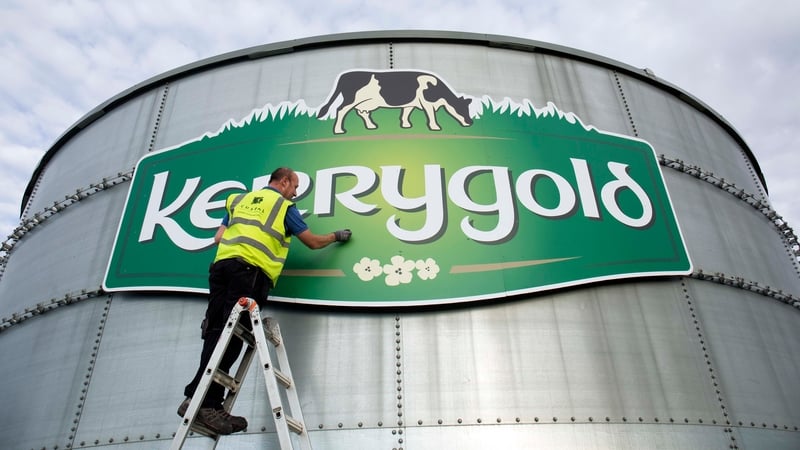EU-based companies selling into the United States breathed a collective sigh of relief when the White House announced a 90-day delay on the implementation of a 20% tariff on imports coming from the single market.
The two sides are now in the midst of trying to hammer out a deal to avoid a high-tariff trading future.
However, despite the reprieve, since 2 April the majority of EU goods sold into the US are still subject to a new baseline tariff of 10%.
While it’s not 20%, it’s still a big jump and the increase will have to be factored in somewhere along the supply chain.
In an Irish context, food and drink suppliers are worst hit, given they account for the vast majority of the near €2 billion in Irish food and drink sold into the US each year.
For example, an American company buying from an Irish supplier can choose to absorb the full cost of the 10% tariff, but realistically this is not the most likely outcome.
Other options include passing the price rise onto the customer or getting the supplier on the Irish side to pay some of the higher tariff.

Some Irish companies – fearing a loss of sales – have already offered to cover some of the increase for their US customers.
One of them is the Shed Distillery, which exports more than a third of the spirits it produces across the Atlantic.
Shed Founder Pat Rigney said his company is able to absorb some of the impact but can’t fully cover it. As a result, Mr Rigney said he accepts the price of his gin, whiskey, and vodka will have to rise in the US and that will likely lead to lower sales.
He also said diversifying into newer markets is an option but that “will only take you so far”.
Surge in US exports suggests Irish brands are stockpiling
Another strategy for Irish exporters is frontloading deliveries, and figures from the Central Statistics Office this week suggest many are going down this path.
Exports from Ireland to the US surged by 210% in February when compared with the same month last year.
This was a pre-emptive move by Irish companies to get as much stock into America before the new tariffs kicked in.
Kerrygold owner Ornua did this but said the company became a victim of its own success, because most of the Kerrygold cheese and butter it attempted to stockpile stateside quickly sold.
Read more:
How US tariff war will affect the price you pay for petrol and electricity
Donohoe warns US tariffs could reduce Irish job growth
Interestingly, the dairy group said the 10% tariff has not affected sales “as yet”.
But at nearly $10 for a pound of butter Kerrygold is a premium brand in America, so any sort of economic decline amid the uncertainty could quickly hit sales.
Another Irish food brand with a strong US presence is Keogh’s Crisps, and Managing Director Tom Keogh is trying to put a positive spin on the situation.
He points out that – tariffs aside – there has been significant food-price inflation in America in recent times that has made products a lot more expensive, and that Irish products sold there are instantly more competitive when compared with domestic US goods.
Mr Keogh adds that he believes this will lessen the impact of tariffs on Irish exports.
Although – as with Kerrygold – much of the Irish produce sold in America is priced at a premium, leaving it especially vulnerable in the event of the buying power of US consumers falling.
No guarantee 20% tariff will be avoided
The reality of the economic threat still facing Irish businesses shouldn’t be underplayed.
On 9 April business group Ibec said some of its member companies in the sectors most impacted by US tariffs have already had orders cancelled or reduced.

While the unpredictability of Donald Trump’s administration and its breakneck-speed policy shifts have shown there’s no guarantee the 20% tariff will ultimately be avoided.
And if it’s not, firms here could be in tricky spot.
Research this week from professional accountancy body ACCA suggests that 72% of Irish businesses had not taken steps to mitigate the potential impact of American trade tariffs.
The survey was conducted before US President Donald Trump’s 90-day tariff pause, but its findings are still reflective of the state of play.
The Brexit experience
However, one factor in Ireland’s favour is experience; major economic disruption due to the actions of a key trading partner is nothing new to the country.
We’ve been here before with Brexit, and solutions such as additional Government support and guidance in seeking out new markets worked effectively then.
Irish companies had to quickly adapt and become more agile to compete in different international markets – and they did so effectively.

It mightn’t come to that this time around with America but if it does there’s a playbook ready to go.
Ever since Brexit, the EU has increasingly solidified its position as Ireland’s largest trading partner, with our dependency on the UK declining.
Well over a third of Ireland’s €224 billion goods exported last year went to EU countries (up 9% year-on-year to €88.5 billion).
Exports to Great Britain stood at €15.7 billion (a 10% fall on 2023).
Though for 2024 – outside of the EU – America was the destination of the most Irish exports (€72.6 billion).
That figure represented a jump of €18.6 billion on 2023.
It’s clear from the figures that diversifying away from the US and into other markets would be a drastic option and trickier than our experience with the British market.
But with the likes of Irish dairy and whiskey proving popular premium products among Americans, sales could prove resilient despite a tariff-related price hike of 10% … or even 20%.




